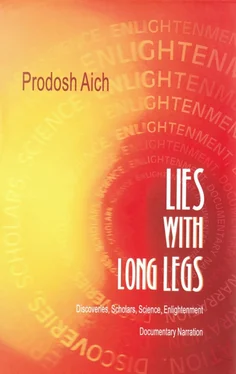The probability of circulating a false story convincingly in a face-to-face communication is extremely low. We remember “Pinocchio” whose nose enlarged whenever he lied. While reading we have to depend upon our ability to decipher and comprehend that the meaning is clear and therefore should be easily understandable. But what happens if some false messages are relayed deliberately? Long or short, we see no noses when reading. And our impression is that we get accustomed to “long noses”. We prefer mediated (passive) communications to direct encounters. We begin to willingly accept whatever is being communicated. Soon the fictitious, the virtual world might become our home rather than the real world.
It is not our purpose to reconstruct the process how the dominance of the external memory has grown and the importance of the “mind–memory” has been diminished. We recall only the “quantum leaps” of this evolution, as already mentioned, the invention of script, printing, film, telegraphy, radio, phone, television, Internet, digitalisation. And we also think of the negative aspects of these “quantum leaps” also. They teach us that the external memory is never a copy, but only a translation ofthe original. And the profiles of a translation are always more blurred than copies and the profiles of copies are more indistinct than the original (except for digital copies). There is no need to emphasise that the translations from copies and the translations of translations become more and more faulty, even without conscious forgery. Just due to the nature of the matter or caused by the “malice of the object”.
We have repeatedly used the expression “quantum leap”. We withdraw this term, which has been taken from the nuclear physics, with an excuse. We had intended to indicate an “unexpectedly giant leap” in the course of a development, and not the behaviour of quanta during nuclear fission. We don’t know anything about it. But using such “terms” leaves marks; it is pretty and impressive but also a bluff and a forgery of idea, isn’t it?
Let us now turn our attention to the unexpected “giant leaps” and let us not be distracted by the “Guinness–question”: how large is large really? The leaps mentioned by us refer to the quantities and possibly to qualities of “storage rooms” and “transport carriers” of knowledge and not to a great leap forward in knowledge level. And we must admit that we don’t know anything about the jumps in knowledge. Why don’t we? This is a non-question for “modern science”. We are children of “modern science”. And the topics, which are not dealt with, are forgotten and buried sooner or later.
Now is the time to apologise for having mentioned a news agency called “Terra” earlier in this chapter. “Terra” never did exist. We admit that we played a little mischief in order to demonstrate how easily a “non existing something” can be brought into circulation in a world of virtual reality. Do we have the time to uncover lies and forgeries? Do we still have that consciousness that makes us recognise that a mountain is nothing more than a stable deposit of different layers of large stones? We must also withdraw our unintentional bluff that: It is not our aim to try to reconstruct here how the dominance of the external memory has increased at the cost of mind-memory and is still increasing. We know nothing about that as well. No research has yet been done on substitutes of mind-memory and on their consequences. This process has been marketed as the “ humanisation of work ” . These facilities have superior selling qualities than that of training programmes to increase the efficiency of “mind-memory”. What do we know about the functioning of our mind-memory? How far has research discovery advanced in this field? What is the extent of knowledge of neurologists, of brain researchers about the brain substance? Brain substance? Can the composition of the brain substances be analytically described and reproduced in labs? How does it function? What can it accomplish?
We cannot neglect the fact that knowledge is directly derived from perception , from discovery vis-à-vis within the immediate environment and from its analysis. The need of storage occurs only after knowledge has been acquired. But the human head as a “store” has always been there independently from our knowledge. In other words, the functioning of the mind-memory does not depend on discoveries of the bio-chemical composition of brain or on invention of “new technologies”. And language belongs to the realm of technology. The script is also a technology. “External memory” is not a discovery. It is an invented tool. A set of technologies might lead more readily to discoveries, to knowledge, but the invention of technologies is never a scientific activity. In fact, invention presupposes accumulated scientific knowledge. We think that a clear distinction between science and technology is necessary for judgement and evaluation of our realities. This distinction alone can lead us to insights into the interrelationship between science and technology. It has been important for us to realise that language, writing, printing and the Internet are mere transport facilities for accumulated knowledge. These facilities become useless when science withers, wastes away, decays and nothing-worthwhile remains to be transported. Who will gain if mere trivia is being transported hence and forth? The shooting of “grouse” on computers would then become more entertaining.
It is important to realise that mediated communication is never a substitute for face-to-face encounters. And the rapid growth of “media institutions” and “media transport”, which we have characterised as an uncontrollable “flood”, makes it impossible for us to understand, evaluate, and check the contents because there just isn’t enough time. We also miss people with whom we could discuss directly on the mediated deliveries. We cannot get rid of the impression that there is a continuous hammering to get things into our head, that the “media” themselves are the major message and not the contents they transport. The printing press, the transistor radio, the television, the Internet, the mobile phones are the messages, not “democratisation”, for example, and not the achievement of “democratic” order. We all know that this development is not a “godsend”, and by using them many people earn a lot of money, and establish their power base. How? Mainly undercover, in secrecy. Ownership is camouflaged. Profits are hidden. Can that be good? Can this be accepted?
Be it as it may, it seems to be taken for granted. Why should an individual in a democratic society become concerned about how a rich person has come to his riches? Isn’t the fiscal secret one of the most important achievements of personal freedom in a “democratic” society and protected like a sacred item? Isn’t one of the most commonly used blanket phrases: “It’s my personal business?” Doesn’t this prevent us from becoming a nation of ugly “social enviers”? Stop us from alarming the bosses and drive them out of the country to some tax paradise? Who will benefit, if they have to desert?
We, however, want to take “our rule” (Democracy) seriously and demand from our rich compatriots a precise account of their wealth. What had been the “price” for that and who paid the price ultimately? And we are not ready to accept that – day in and day out – we are brain-washed with “information” that is not checkable, not verifiable. But how can we achieve that goal? What do we have to do?
We do not know everything that could be done in order to escape the dangers of brainwashing. However, we can tell what we have undertaken and what we have learnt in this process. Only this much is given away in advance: We are becoming increasingly comfortable with this stratagem. We only took small steps in the beginning: reading. For a long time many established and scholarly scientists have convinced us through their books that the contexts are extremely complicated in a democracy – no sorry – in a “representative parliamentary democracy”, in industrialised and “modern” societies. The matters are supposed to be so complicated that we as common people cannot look through the interdependencies and are thus unable to comprehend what is happening. Does it make any sense spending our limited life span trying to understand what is happening around us and with us? Why shouldn’t we as common people just learn to trust those “super-brains”, the elite, who have been trained with great effort? This elite has developed exceptional intelligence and excellent training. It has gained total understanding and an overall view of our society, thanks to our financial aid. Amongst them there are “critical scientists” with their “critical books”. Don’t they take care of the grievances in society, and don’t they evaluate the grievances and tell us exactly what is to be done? Is it not better to trust them than trying to control them? Doesn’t it make us carefree and happy learning to trust?
Читать дальше












